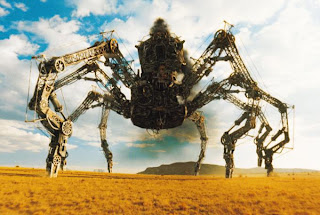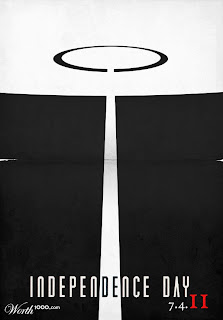
It has now been four years since Will Smith last appeared in a film. For me, this has been a dark period of cinema as I’ve missed his smiling face and energetic brand of playful comedy. The longer Smith has been away from the camera, the more acceptable it has become to question his ability as an actor and that’s not okay in my book. Now to be fair, as a male in his later 20s, I have been in Smith’s key demographic for the entire length of his career and I admit at least part of my appreciation for the man is due to the memories of how awesome his movies were when I was a kid. Regardless, however, I’m of the opinion that Smith is an insanely talented guy with more range than he’s ever given credit for. Yes, he makes his most indelible marks by doing his standard thing and yes, he is certainly guilty of playing it safe rather than taking the chances that some of his contemporaries have jumped at. But at the end of the day, Smith brings an insane level of enjoyableness to his films and still belongs on the ever-shrinking list of truly bankable stars. With Men In Black 3 debuting today, I felt it pertinent to revisit an old standard, The Collected Works, and rank each of the films from Smith’s career. Enjoy.
(If you’re unfamiliar with The Collected Works, the object is to rank every film a given actor or director has worked on from the worst to the best. These ranks pertain to the films first and performances second.)
Movies I haven’t seen: Made in America (1993), Six Degrees of Separation (1994)
16. Men in Black 2 (2002) – Agent Jay
By Smith’s own admission, this movie (and the number 14 movie on this list) represents a career low. Coming off the unsuccessful Ali (his first dramatic role), Smith reverted to the safety (and paycheck) of a role that he knew. No one involved with this movie wanted to be on set and that showed in the finished product. In my mind, MIB 2 is one of the worst movies of the decade.
 15. Wild Wild West (1999) – Captain James West
15. Wild Wild West (1999) – Captain James WestBecause anytime you can build an entire plot around a giant mechanical spider tromping through the Old West, you have to do it. I can’t blame Smith for this one. On paper, Wild Wild West should have fallen right in line with Independence Day and Men in Black as a fun summer blockbuster with a wide range of appeal. Instead, it was a complete and utter disaster, though it did turn a healthy profit. I hold this movie responsible for creating a fear of Westerns in Smith and leading him to turn down a role in Quentin Tarantino’s upcoming Django Unchained.
14. Bad Boys 2 (2003) – Detective Mike Lowery
Bad Boys wasn’t awful (more on it in a moment) but this sequel was as much of a money grab as MIB 2 was and really doesn’t bring anything to the table worth discussing. It’s a bloated mess (147 minutes long!!!) that should have been a signal of what was to come in Michael Bay’s future Transformers franchise. Smith’s character is unquestionably the best part of this movie but that’s not saying just a whole lot.
13. Shark Tale (2004) – Oscar
Smith’s only foray into the world of animated features didn’t provide much to write home about. It is a prime example of the DreamWorks animation method: develop a decent idea, assemble a great cast, and piece together a soulless film that kids will watch and parents won’t hate but no one will really care about.
12. Bad Boys (1995) – Detective Mike Lowery
This one has some really strong moments and some great action sequences (the hallmark of a Michael Bay film, of course). It was also a pretty smart career choice for Smith who was wrapping up his run on the family-friendly Fresh Prince of Bel-Airand was provided an opportunity to show a little edge in the R-rated Bad Boys. But while the action is great, the movie as a whole it fairly lackluster. I will, however, watch portions of this one if it pops up on HBO while I will flip the channel immediately if the sequel comes along.
 11. Ali (2001) – Cassius Clay/Muhammad Ali
11. Ali (2001) – Cassius Clay/Muhammad AliThis one still hurts me. As a sports nerd, there are very few athletes who are more fascinating than Muhammad Ali. As a film nerd, the idea of combining Michael Mann (director of Heat, one of my ten favorite movies) and Smith was overwhelmingly awesome. And then the film was kind of a beating. I think Mann tried too hard to appeal to everyone (critics and moviegoers alike), probably due in part to the bloated budget ($107 million) and the Christmas release date. Ali is convoluted and boring and that’s a real shame because Smith’s portrayal is OUTSTANDING. This one should have been a great movie tied together with a great performance and instead it became a great performance in the midst of a middling movie.
10. Hitch (2005) – Alex ‘Hitch’ Hitchens
Hitch loses points in my book because it becomes less and less enjoyable with each viewing. In 2005, this was a solid date movie. Now that we’re seven years down the line and TNT replays it ad nauseam, I’m a little bit tired of Hitch. Smith is good, though, in his only romantic comedy to date and his charisma comes through in spades.
9. Seven Pounds (2008) – Ben
I’ve only seen this movie once and to be honest, I’m no longer sure of how I actually feel about it. At the time of my viewing I was completely haunted by both the film and especially by Smith’s performance. Since that time, I’ve seen many scathing reviews of the film that have become mixed in with my own interpretation. What I do know is this: Smith KILLED IT in this role. Pretentious as the film may be, the performance was one that stuck with me for a very, very long time.
 8. Hancock (2008) – John Hancock
8. Hancock (2008) – John HancockI could have moved this one up or down the list several spots. There are parts of Hancockthat I absolutely love. And then there are parts that beg for the cutting room floor. It is a slightly darker role for Smith which I greatly appreciate and that, plus a fun back-and-forth with Jason Bateman, makes this a solid movie on most days and if you’re in the right mood, it can be downright awesome.
7. Enemy of the State (1998) – Robert Clayton Dean
If this isn’t the prototypical Tony Scott film then I don’t know what is. By putting Smith on the run and teaming him with Gene Hackman, Scott gave the star a break from summer blockbuster fodder and put him a more serious (though still action-oriented) role. What holds Enemy back is the fact that I’ve always felt like Smith had trouble keeping up with Hackman and the movie suffers as a result. It has been a while since I’ve seen this, though, so perhaps it’s due for a review.
6. I, Robot (2004) – Del Spooner
I, Robot is the antithesis of Hitch for me. Whereas I enjoyed Hitch quite a bit initially but have grown tired of it over the years, I wasn’t all that enamored with Robot when it debuted but I’ve grown fonder of it since. I think the biggest issue for this one is that it was slightly ahead of its time. Many of the special effects shots just don’t work that well and with the $120 million operating budget the movie was blessed with, much more could have been done only a few years later. The storyline is strong, however, and Smith gives a good accounting of himself in a role that isn’t as easy as it might look.
5. The Pursuit of Happyness (2006) – Chris Gardner
If you think it is an uplifting tale about the power of the human spirit, then I say you’re right. And if you think it’s a cloying, over-emotional sap fest then I say you’re also right. It is both of those things and whether or not you like this film is dependent on how you respond to both sides of that coin. I personally fall into the prior group as I find Pursuit to be heartfelt and touching in spite of its obvious nature. It also brought Smith his well-deserved second Oscar nomination.
4. The Legend of Bagger Vance (2000) – Bagger Vance
If anyone ever read this space, I’m sure I’d catch hell for listing Bagger Vance so far up this list. There’s a very good chance that my dad and I are literally the only humans on the planet who like this movie. Bagger Vance has been lambasted for its failed Oscar aspirations and perceived dullness but nevertheless it speaks to me. I find it to be an eloquently written, beautifully shot film that is flush with quality performances (Smith’s is GREAT in my opinion) and powerful themes. I love this movie. LOVE it. (What say you to this, mythical readers?!)
3. I Am Legend (2007) – Robert Neville
These last three could have come in any order. I Am Legend gets docked points because the special effects are weak and it doesn’t hold up quite as well after multiple viewings. What does hold up is Smith’s performance. Really and truly, I believe this is Smith’s finest work. He’s basically working alone for 70 minutes and he completely owns the screen. With better effects, I think Legend is much more well-remembered film than it is.
2. Men in Black (1997) – Agent Jay
The great thing about MIB, and what makes it hold up 15 years later, is its intelligence. At times it gets lost in all the ridiculous entertainment and wise cracking but this is a smart, smart movie. It also has a nice touch of darkness to it that I think set it apart from the average summer blockbuster of the time. Director Barry Sonnenfeld probably deserves a great deal of credit for getting Smith to expand his range a bit and accentuated his intelligence. In truth, MIB is very close to a GREAT movie.
1. Independence Day (1996) – Captain Steven Hiller
All cards on the table: I have emotional attachments to Independence Day that prevent me from looking at it objectively. I’ve been ridiculed for the high place I give this movie before and I’ve tried to look at it from its detractor’s viewpoint but I just can’t do it. I was 12 or 13 when the marketing for this movie started to make the rounds and by the time it finally opened, I was more excited for it than any other movie ever (with the exception of Jurassic Park). I still remember sitting front row on opening weekend with my cousins and when Brent Spiner popped open the alien’s chest cavity on the operating table, my brother literally jumped up and ran out of the theater in fright. It. Was. AWESOME. As such, I love this movie. I love the anachronisms (Jeff Goldblum’s computer was SUPER advanced for 1996), I love Bill Pullman’s cheesy speech (“That’s right, President Whitmore! We WON’T go quietly into the night!”), and I looooovvvvve Smith’s ridiculously fun performance. If you weren’t 13 in 1996 then I completely understand not appreciating this movie but to this day it remains on my list of favorite films and I’ll stop down to watch it just about every time I stumble across it.
So there are my rankings. Agree? Disagree? Let me hear from you!
































